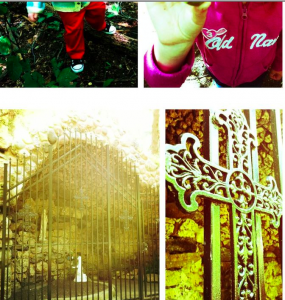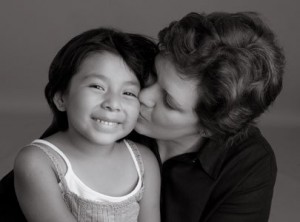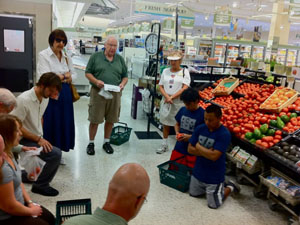Community
[caption id="attachment_34028" align="alignleft" width="214" caption="Detail of a sculpture at the site of a former slave market, Christ Church, Zanzibar. By Cathleen Falsani."][/caption]
 "Jesus' spirituality was magnetic. Wherever he went, people gathered. His love, understanding and compassion toward humanity was overflowing and people traveled from afar to find solace in his teachings and to breathe life into their spiritual lives. His message of inclusiveness was seen as a threat by the religious leaders of his time -- whose very existence relied on a system of exclusivity."
"Jesus' spirituality was magnetic. Wherever he went, people gathered. His love, understanding and compassion toward humanity was overflowing and people traveled from afar to find solace in his teachings and to breathe life into their spiritual lives. His message of inclusiveness was seen as a threat by the religious leaders of his time -- whose very existence relied on a system of exclusivity."
Not every Christian who shares my concern for the poor has the same view on policy or politics. But, here is a prejudice I am not going to back away from.
To be a follower of Christ is to be biased for the poor.
In life, we all have our biases. Some of them are natural tendencies or inclinations and others are habituated. Our culture tells us to be biased -- in a deferential sense -- towards those who can pay us back or who can look out for us in return. Society tells us to get in with the strong and the powerful because they will give us strength and power in return.
Jesus teaches something very different.
 Could my mission really be confined to seeking the best for the children to whom I gave birth? Or, as a Christian, should I define "family" more broadly? I'd see images of women and children suffering around the world, and those puzzling verses returned to my mind. Maybe, instead of obsessing over the happiness of my babies, I should stick my head out of the window, so to speak, look around, and ask, "Who is my family?"
Could my mission really be confined to seeking the best for the children to whom I gave birth? Or, as a Christian, should I define "family" more broadly? I'd see images of women and children suffering around the world, and those puzzling verses returned to my mind. Maybe, instead of obsessing over the happiness of my babies, I should stick my head out of the window, so to speak, look around, and ask, "Who is my family?"
It didn't feel right to simply shrug my shoulders and blithely accept my good fortune as compared to that of people born into extreme poverty. I'd buy my kids their new school clothes and shoes and then think of mothers who did not have the resources to provide their children with even one meal a day. I'd wonder: what's the connection between us? Does the fact that $10 malaria nets in African countries save whole families have anything to do with my family buying a new flat-screen TV? Should it? Is there any connection between me, a suburban, middle class mom, and women around the world?
Sojourners has always tried to understand and advocate for "biblical politics." But what does that mean now, especially as we approach another major election?
I was talking the other day to a Christian leader who has given his life to working with the poor. His approach is very grassroots -- he lives in a poor, virtually all-minority community and provides basic services for low-income people. He said, "If you work with and for the poor, you inevitably run into injustice." In other words, poverty isn't caused by accident. There are unjust systems and structures that create and perpetuate poverty and human suffering. And service alone is never enough; working to change both the attitudes and institutional arrangements that cause poverty is required.
Ten years on, I'm remembering the literature I read and the music that kept me going in the days and months after 9/11. I had Rumi and Whitman on my bedside table, reading them back to back, alternating between selections of the Mathnawi and poems from Leaves of Grass, sometimes feeling like the two were one, the soul of America, and that the soul of Islam were intersecting at some point beyond where the eye could see:
Whoever you are!, motion and reflection are especially for you, The divine ship sails the divine sea for you. -- Walt Whitman
Come, come, whoever you are, Wanderer, worshipper, lover of leaving, Ours is not a caravan of despair. Even if you have broken your vows a thousand times It doesn't matter Come, come yet again, come. -- Rumi
Until then, the Quran for me was a book of personal spiritual guidance, a convening symbol for my religious community. But after 9/11, I viewed it as a balm for my country's pain, especially lines from Ayat al-Kursi: "His throne extends over the heavens and the earth, and He feels no fatigue in guarding and preserving them."
Deep down I don't believe in the separation of church and state. Oh, I am against the idea of a state church or giving political preference to one religious sect or another, but it's the idea that somehow people can divorce their religious identity from their political identity that I just can't accept. That either our religion or our politics mean so little to us that we could restrict them to compartmentalized spheres in our lives seems absurd to me. I know people attempt to do it all the time, believing in the modern myth that an individual can assume an objective stance in this world, but reality is a lot more complex than that.
Rose Berger from Sojourners magazine spoke to the hundreds of us gathered in Lafayette Park just before we processed to the fence surrounding the White House. She mentioned the irony of building a monument to Dr. Martin Luther King, Jr. by the powerful political forces who disregarded or dismissed his message during his lifetime -- we only honor him after he is safely dead. How ironic also that the dedication of the monument was postponed by the most recent example of significant climate change. Will evidence of climate change begin to also signal political change?
Rose called on us to take up the banner of the Living Spirit of Dr. King within ourselves and allow it to inspire us as we risked arrest by calling on President Obama to take a clear stand to help protect our environment and begin to make a U-turn from the climate change path we are traveling as a nation and culture. We are part of a two-week vigil and civil disobedience action calling the president to deny permission for building the proposed Keystone XL Pipeline from the environmentally devastating tar sands/oil shale development in Alberta, Canada to refineries in Texas.
The evangelical world expands to a far-off horizon and the topographical valleys and peaks cover landscapes that are both long and wide. Many in the media seem to have little knowledge of how large of a space the evangelical map covers. So, with this said, I welcomed Ross Douthat's thoughts in Monday's New York Times. His column, "American Theocracy Revisited," places good markers on the fears that Rick Perry and Michelle Bachmann's presidential runs are nothing more than an attempt at theocracy.
In much of the coverage of these two campaigns, the evangelical world gets flatten, stereotyped, and portrayed as only coming from one narrow point. Whether or not you agree with this view, the fact remains that any group that includes Miroslav Wolf, Jim Wallis, RC Sproul, Rick Warren, Joyce Meyers, Philip Yancy, Chuck Missler, Rob Bell, Albert Mohler Jr, TD Jakes, Amy Grant, Tony Campolo, Lucy Swindoll, Debrah Joy Winans, and so many more hues and colors of evangelicalism should not be placed in one bag and shaken into one lumpy mess, while saying that any one of their diverse views politically are the one true color. I know many will view this list and say who should or should not belong, and then justify their choices. A coherent political agenda could not be drawn from such a list of people. But following Jesus and making Jesus known in the world is at the core of each of these people's identity. Many on the list may disagree as to the best way to provide for the widows and orphans, but all would agree that we must care for them.
We had a very hot ride in the police van, but the Park Police processed us very quickly. We were released from custody and greeted outside with water, granola bars, and hugs. What could be better?
But the point was not to get arrested. The point was to make of our lives a living witness. To make it clear that climate change has gone too far and we are no longer going to stand idly by while our sisters, brothers, and home planet are torn apart by oil companies. Here are a handful of photos from the event yesterday:
The comment code of conduct for the God's Politics blog includes familiar commitments to civility, courtesy, and respect, and even connects these pledges to biblical passages. But what if we went a step further in our understanding of blog comments -- and, for that matter, all of our online communication? What if we recognized our forays into online commentary as doing theological work?
Karl Barth invites that kind of thinking in his 1963 Evangelical Theology: An Introduction. In his chapter on the "community" -- a word that he argues is, theologically speaking, much better than "church" to describe the body of believers -- Barth makes the case that each member of the community of faith has the responsibility to bear witness to the Word. We do so, Barth says, in our very existence, in our service to "the handicapped, weak, and needy" in the world, and in our prayer. The community also does so in spoken and written words by which it "attempts to make its faith audible."
The forthcoming dedication of the national memorial monument honoring Rev. Dr. Martin Luther King, Jr., affords an opening for considering the complexity and meaning of his leadership. He was not the tamed and desiccated civil hero as often portrayed in the United States around the time of his birthday, celebrated as a national holiday. He was until the moment of his death raising issues that challenged the conventional wisdom on poverty and racism, but also concerning war and peace.
King was in St. Joseph's Infirmary, Atlanta, for exhaustion and a viral infection when it was reported that he would receive the 1964 Nobel Peace Prize. As Gary M. Pomerantz writes in Where Peachtree Meets Sweet Auburn, this was the apparent cost exacted by intelligence surveillance efforts and the pressures of learning that Attorney General Robert F. Kennedy had formally approved wiretaps by the Federal Bureau of Investigation. His evolving strength as a leader is revealed in his remarks in Norway that December, which linked the nonviolent struggle of the U.S. civil rights movement to the entire planet's need for disarmament.
Rise of the Planet of the Apes is a surprising addition to the typical summer blockbuster canon -- for one thing, it manages to entertain and challenge, without resorting to gratuitous violence to make its point. But there's a deeper subtext that is even more unexpected -- for this is a story in which we start to lose.
It was fashionable in the late 1960s and early '70s for science fiction films to attempt to out-dystopia each other -- see for example the notion in Soylent Green that post-industrial humanity snacks on itself to survive, the suggestion that only robots can be trusted to look after creation in Silent Running, and the climactic revelation in the original Planet of the Apes that a few generations from now, the nuclear arms race will end in mutually assured destruction. All these point to a simple philosophical idea: that humans cannot be trusted to care for ourselves or the planet we steward.
In reading some of the responses to my last post Embodied Theology, I was reminded of an essay I wrote for a class last semester, so I've rewritten part of it as a blog post to help clarify my position.
Embodied theology is rooted in the doctrine of creation. Why did God create us? As some have proposed, God couldn't not create or love us -- it's just part of God's nature. As a relational giver and lover within the Trinity, God couldn't help but be the same thing in relation with humanity. Who we are comes from God. We are not by nature sinful broken creatures, but creatures shaped in the very image of God.
I remember vividly the first time I went to a comic book shop with my mom. I'd sneaked there before. But this time was different. This time I'd come without pretense, openly confessing my love of the four-color art form. I was in the fifth grade.
While I perused the back issue bins in the middle of the shop, my mother looked from one rack to the next, her face slowly solidifying into a grimace. On one cover, a half-naked green man punched a half-naked rock man in the head. On another, a woman wearing spandex tight enough to be body paint draped herself over some sort of futuristic motorcycle. Eventually, my mother's eyes fell upon the cover of a sword-and-sorcery title near the cash register. Behind a tan, sinewy barbarian stood a harem of women, all wearing thin strips of well-placed linen. We left before I could make a purchase.
For the past 30 years, through my work with Maryknoll and Pax Christi International, I've come to know grassroots communities around the world in situations of war and poverty. My mission focus base been largely international, but people, were in the "center of my screen." The environment, I thought, would have to wait.
A few weeks ago, I went with two of my grandchildren, Lauren (10) and Bobby (9), to see the documentary Hubble, which is about NASA's final shuttle expedition to repair a a broken part of the Hubble telescope. We watched in awe at the spectacular photos of the expanding universe. What an amazing sense these photos give of our own location as humans who are part of a larger earth community, who are part of a cosmos with which our own future is inextricably linked.
 To the farmers who grow our food, the harvesters who pick it, the transporters who bring it to market, the grocers who present it, and the cooks who prepare it.
To the farmers who grow our food, the harvesters who pick it, the transporters who bring it to market, the grocers who present it, and the cooks who prepare it.
Here's the prayer we prayed at a nearby Publix grocery in the produce section on Friday:
A Prayer for Publix
Living God, you are the Creator of this beautiful and fertile world. You made sun, rain, soil, air, seed, and seasons. We praise you for the green of lettuce, the yellow of lemon, the orange of a tangerine, and especially for the bright red of a tomato. They are beautiful to our eyes, delicious to our taste buds, and nourishing to our bodies. We pray to the Lord, Lord, hear our prayer.